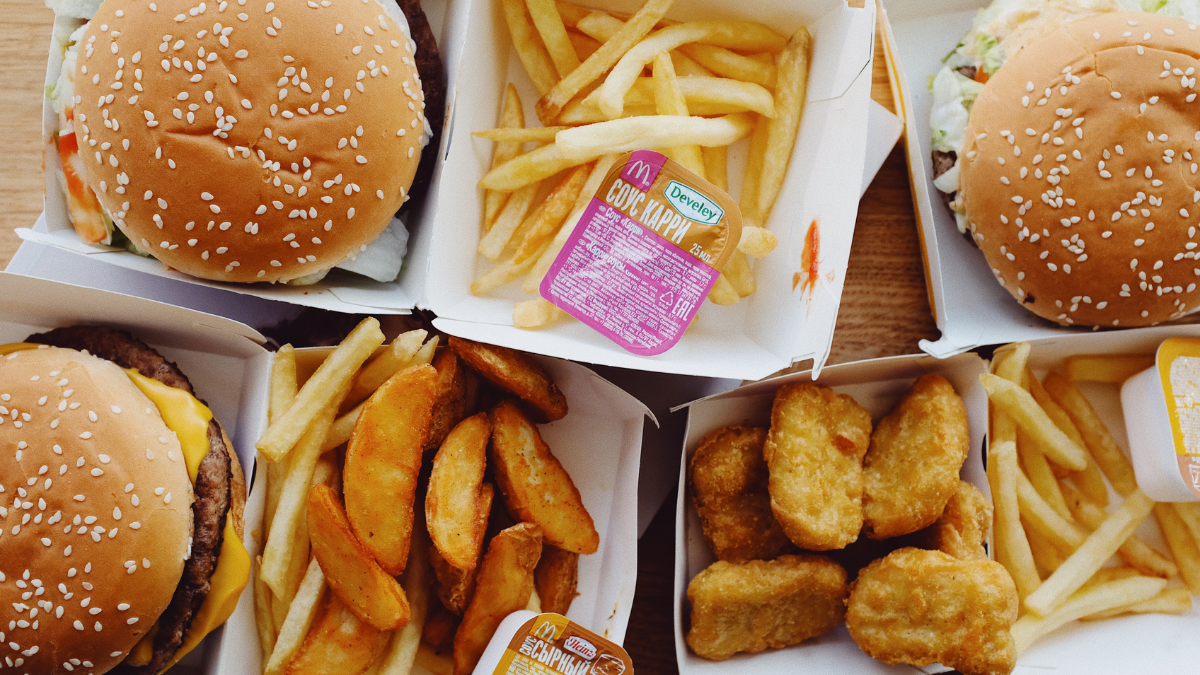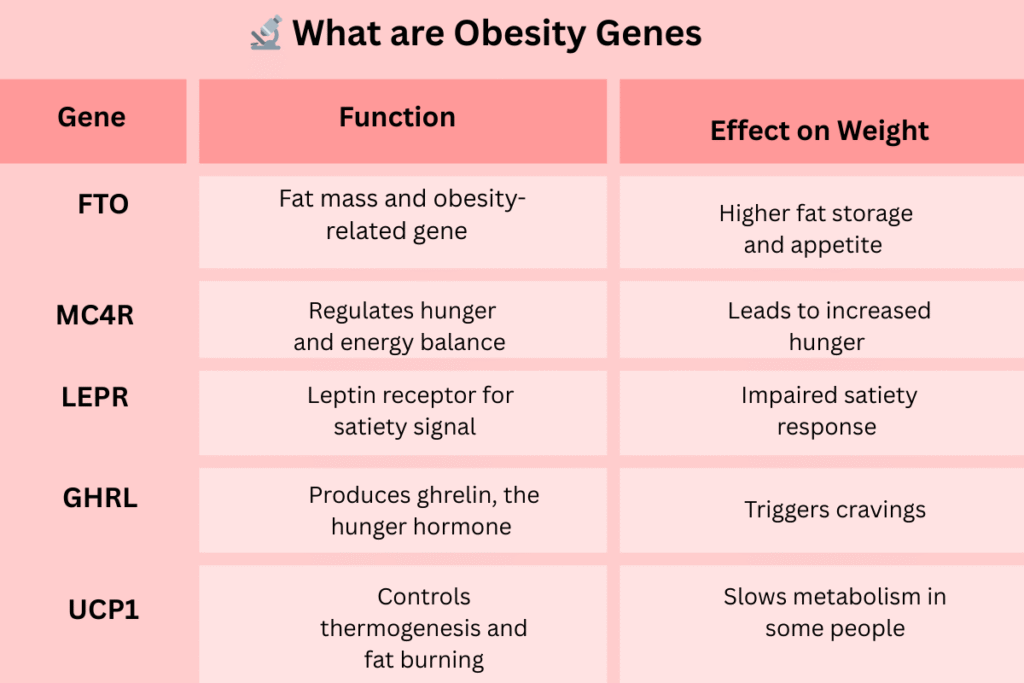
Hey there! If you’re reading this, you’re probably frustrated with your weight. Maybe you’ve tried everything – diets, exercise, cutting calories – but nothing seems to stick. You’re wondering: is it my genes or junk food that’s making me gain weight?
I get it. You see skinny people eating pizza and staying thin while you gain weight just looking at a donut. It feels unfair, right?
Today, we’re going to figure out the real cause of obesity and, more importantly, learn how to beat obesity for good. No complicated science talk, no judgment – just simple answers that actually make sense.
In this article, we’ll explore:
- How genes affect weight gain
- The impact of processed foods on obesity
- Scientific studies on metabolism and fat storage
- Real-life case studies & surveys
- Practical tips to manage weight effectively
Let’s dive into science!
🔬 What are Obesity Genes ?
Obesity genes are genetic variants that increase the risk of weight gain. According to the NIH and WHO, some of the most studied genes include:

How Genes Influence Weight Gain (The Science Behind Obesity)
1. The FTO Gene: The “Fat Gene”
- A study from NIH (National Institutes of Health) found that people with the FTO gene variant are more likely to store fat.
- This gene affects appetite control, making individuals crave high-calorie foods.
2. Leptin Resistance: Why Some People Feel Hungrier
- Leptin is a hormone that signals fullness.
- Harvard Medical School research shows that some people develop leptin resistance, leading to overeating and weight gain.
3. Slow Metabolism: Blame Your Parents?
- Thyroid and metabolic genes can slow down calorie burning.
- A Mayo Clinic study found that genetics account for 40-70% of BMI variations.
🍕 Junk Food’s Role in Weight Gain
Now let’s talk about the other side of genes or junk food debate. Ultra-processed foods are everywhere – fast food, packaged snacks, sugary drinks. These foods are designed to make you want more.
Food companies spend millions figuring out the perfect mix of sugar, salt, and fat to keep you coming back. It’s not your fault that you can’t stop eating chips – they’re literally engineered to be addictive.Here how Junk Food Triggers Obesity
1. Processed Foods Hijack Your Brain
- Sugar and fat trigger dopamine, making junk food addictive (WHO Report).
- A Stanford University study found that ultra-processed foods lead to 500+ extra calories per day.
2. Insulin Resistance & Fat Storage
- High-sugar diets cause insulin spikes, promoting fat storage (NIH Study).
- Trans fats in fast food increase belly fat (American Heart Association).
3. Real-Life Case Study: The Fast Food Experiment
- A 2004 documentary (“Super Size Me”) showed a man gaining 24 lbs in 30 days from eating only McDonald’s.
📈 Calorie Comparison – Junk Food vs. Whole Foods
| Food Item | Calories | Fat (g) | Sugar (g) |
| Big Mac 🍔 | 550 | 30 | 9 |
| Apple 🍎 | 95 | 0.3 | 19 |
🧪Case Study: Identical Twins, Different Environments
A 2022 NIH-funded twin study observed identical twins where one lived in an urban fast-food environment and the other in a rural setting. Despite having identical genes:
- The urban twin gained 19% more body fat in 18 months.
- The rural twin maintained normal BMI with homemade meals and exercise.
Studies show that ultra-processed food consumption increases obesity risk by 55%. This makes junk food a major real cause of obesity in modern society.
✅ Conclusion: Genes predispose, but environment triggers the outcome.
📚 Citation: NIH Obesity Research Task Force. (2022). Genetic Risk and Environmental Triggers of Obesity.
🧠 Epigenetics: How Junk Food “Switches On” Bad Genes
Epigenetics refers to how lifestyle influences gene expression. Junk food can “turn on” obesity-promoting genes without altering the DNA itself.
| Epigenetic Mechanism | Junk Food Impact |
| DNA Methylation | Alters fat metabolism genes |
| Histone Modification | Changes hunger-regulating pathways |
| MicroRNA Expression | Impairs insulin sensitivity |
📌 Source: WHO Report on Genetics and Obesity. 2021.
📉 Obesity Rates in Countries with Different Diets
(Visualizing How Diet Impacts Weight – Based on WHO Data)
| Country | Obesity Rate (Adults) | Primary Diet Type |
| United States | 42.4% | High in processed foods, sugar, fast food |
| Japan | 4.3% | Fish, rice, vegetables, portion control |
| Italy | 19.9% | Mediterranean (olive oil, whole grains, lean protein) |
| Mexico | 32.4% | High soda consumption, fried foods |
| India | 3.9% | Plant-based, lentils, spices, low processed foods |
💡 How to Outsmart Your Genes & Junk Food Cravings (Science-Backed Strategies)
Just because you’re genetically prone to weight gain doesn’t mean you’re doomed! Research shows lifestyle changes can “switch off” obesity genes and rewire cravings. Here’s how to work with your biology—not against it:
1. Hack Your Hunger Hormones
- Protein at Every Meal: Studies show protein reduces ghrelin (hunger hormone) by 30% more than carbs or fat. Try:
- Greek yogurt (20g protein per serving)
- Mediterranean Diet: Reduces FTO gene impact.
💡 Study: A 2023 Harvard study showed FTO carriers lost 2x more weight on Mediterranean diets.
- Lentils or chickpeas (plant-based powerhouse)
- Grass-fed whey protein
- Fiber-First Rule: Start meals with veggies or a fiber supplement like psyllium husk to slow digestion and prevent sugar spikes.
2. Trick Your Taste Buds
Craving something sweet or salty? Swap junk food with these genius alternatives:
- Dark chocolate (70%+ cocoa) → Satisfies sugar cravings with antioxidants. (Example: Lindt Excellence)
- Roasted seaweed snacks → Crunchy, salty, and packed with iodine.
- Protein popcorn → Brands like SkinnyPop offer high-fiber, low-calorie options.
3. Move for Your DNA
- Strength training 3x/week: Builds muscle, which burns more calories at rest (even with a slow metabolism).
- NEAT (Non-Exercise Activity): Walk after meals, use a standing desk, or try a fitness tracker to monitor steps.
4. Sleep Your Way to a Faster Metabolism
- Poor sleep increases cravings for junk food by 45% (American Journal of Clinical Nutrition). Try:
- Magnesium glycinate before bed → Improves sleep quality.
- Blue-light blockers → Wear amber glasses if you use screens at night.
5. Test, Don’t Guess
- DNA kits (like 23andMe or Nutrigenomix) can reveal if you carry the FTO gene.
- Continuous glucose monitors (CGMs) show how your body reacts to foods.
📝 Survey Insight: What People Think
| Belief | % Respondents |
| Weight gain is mostly genetic | 47% |
| Food is the only cause | 28% |
| Both genes & junk food | 25% |
🧾 Expert Advice from Doctors
Dr. Lisa Feldman, Endocrinologist:
“Your genes are not your destiny. Healthy choices can override most genetic disadvantages—especially when made early in life.”
Conclusion: Junk Food or Junk Genes? You Decide!
While junk food triggers weight gain, junk genes may set the stage. The key takeaway is that genes load the gun, but lifestyle pulls the trigger. If you carry risk genes, being extra mindful of your diet can make all the difference.
⚠️ Disclaimer:
This article is for educational purposes only and is not intended to provide medical advice, diagnosis, or treatment. Obesity is a complex condition influenced by genetics, lifestyle, and environmental factors. Always consult a qualified healthcare professional before making changes to your diet, exercise routine, or treatment plan.
❓FAQs
Q1. Can a DNA test show my risk of weight gain?
Yes. Many tests (like 23andMe, Genomelink) detect FTO, MC4R, and other obesity-related genes.
Q2. Can lifestyle beat genetic obesity?
Absolutely. Diet, exercise, and stress management can override many gene expressions.
Q.3How long does it take to beat obesity?
Sustainable weight loss averages 1-2 pounds per week. Expect 6-12 months for significant results, with lifestyle changes taking 3-6 months to feel automatic.
Q.4 Is obesity more genes or junk food?
Research shows it’s both. Genetics contribute 40-70% of obesity risk, but environmental factors like diet determine whether those genes are expressed.
Leave a Reply